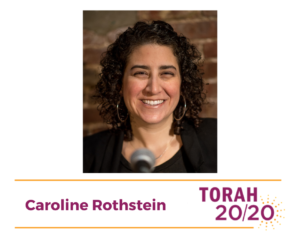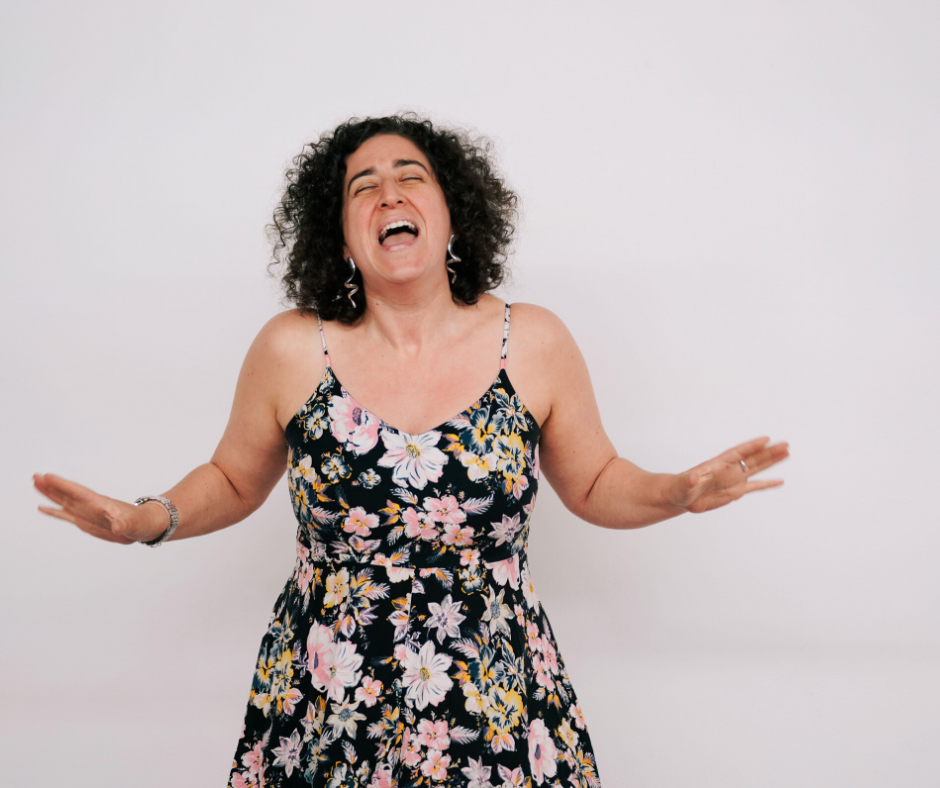A d’var Torah for Terumah (Ex.25:1-27:19) by Caroline Rothstein.
I am an artist. That’s been my identity, purpose, and path since I was three years old and slid on ballet shoes to dance across a recital stage. Then came poetry. And nonfiction prose. Then came singing, acting, musical theater, jazz and modern and hip-hop dance, improv comedy, and ultimately — when I got to college — spoken word poetry, where I found a medium by and through which I could integrate both my writing and performance skills while also speaking my truth.
Last year, after a lifetime of making art and a full-time career as a professional artist, I reached a moment of existential doubt: the world is unraveling, the country is a mess — is making art enough of a real and meaningful job in a moment of literal life or death for everyone on earth?
But then I realized: art may be the — or at least a — catalyst, gateway, door that can save us. As an educator, I’ve traveled the country and world performing poetry and facilitating workshops that center art — most often performance poetry — as a stimulus to inspire others to find their voices, speak their own truths, and give themselves permission to be their fullest selves. And from there — by collectively experiencing and creating art — community happens. Republics are built.
Sign up to receive Torah 20/20 in your inbox each week.
In Parshat Terumah, we find our crew of Israelites rocking out in the desert after liberating themselves from slavery in Egypt. Here they are — a disparate band of former slaves — beginning to reckon with their identities, their purposes, their selfhoods, their truths. Both individually and collectively. Who are they? What are they doing? How shall they live?
And then God assigns them an art project. God says, in Exodus 25:8:
“They shall make for Me a Sanctuary, and I shall dwell amidst them.”
That’s it. That’s the Tweet. The tabernacle is God’s art project for the Israelites to find a common purpose and cause by collaborating, by co-creating, and by taking their scattered voices and molding some kind of harmony amidst the cacophony of wandering in the desert.
In Terumah, God is our teacher. Our arts educator. Art provides a house — a container, a place, a shared space — where we can come together with our multifaceted narratives and intersectional identities and collectively dwell and find literal common ground. We don’t have to agree. We don’t have to have the same beliefs. But we do ask ourselves to show up, together, as one.
Art can offer us a model of how expression itself is a means of amalgamating and dreaming into existence the kind of community, nation, world we are together looking to build. Let’s be honest. It’s a mess right now — both the world and this American project — this attempt at a nation. It’s a mess because it was founded, as we know it today, through some super-duper messy means. But that doesn’t mean it has to fail. That doesn’t mean we can’t still learn to dwell.
I can’t tell you how many times I’ve walked into a space — a middle school, a summer camp, a conference, a corporation, a theater, a makeshift stage — walked sideways into conversations centered around curiosity, identity, politics, emotions, trauma, triumph, grief, and loss, and witnessed a room transform simply because I shared my stories and experiences. My art gave people permission to share their stories — whether through dialogue or also by creating their own art.
Find more commentaries on Parshat Terumah.
Art is a call to action. Art is a language for the soul. In modeling our own feelings and experiences through this particular dialect, we give each other permission to break open and free.
Like the tabernacle was a sanctuary we made to learn how to share space, so too can the art we create now and in the generations to come be where and how and why we dwell into wholeness.
Art has saved my life. And art has saved civilizations and humanity time and time again. And while we’ve had countless dire times before as a species and a planet, I’d say it’s especially urgent now. I think that art can save us all. I think if we center our faith around expression, we might make it out of this masterpiece of a cultural, climate, cataclysmic thunderstorm alive.
Caroline Rothstein (@cerothstein) is an internationally touring and acclaimed writer, poet, performer, and educator. Her work has appeared in Cosmopolitan, Marie Claire, BuzzFeed, NYLON, Narratively, The Guardian, The Forward, Kveller, and elsewhere.

